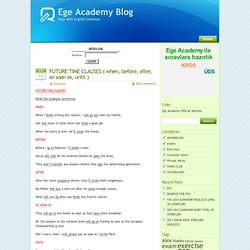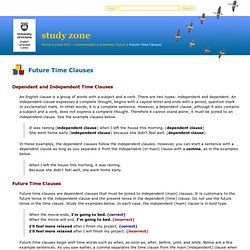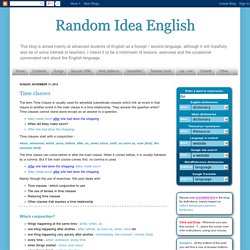

Adverbial Clauses of time. Practice tags and adverbial clauses of time. Practice using adverbial clauses of time. FUTURE TIME CLAUSES ( when, before, after, as soon as, until ) Read the example sentences When I finish writing the reports, I will go out with my friends.

She will move to ? Zmir when she finds a good job. When the party is over, we’ll clean the house. Before I go to Bodrum, I’ll book a room. Murat will visit all his relatives before he joins the army. They won’t transfer any players before they sign the advertising agreement. After her sister prepares dinner, they’ll invite their neighbours. My father will buy a new car after he saves enough money. What will you do after you finish the French course? They will go to the beach as soon as they have their breakfast.
All the players in the national team will go on holiday as soon as the Europian Championship is over. Don’t worry mom. You can go out. They won’t start the match until the rain stops. I won’t buy anything new until I pay all my debts. If I go home early tonight, I will watch the Olympic Games. Tar? If you pass the test, what will you do? Main clauses in these sentences are followed by future ‘will’. Time clauses. Time Clauses. Time clauses: after, as soon as, before, till, when, while. Verbs in time clauses and if clauses. Future Time Clauses. Dependent and Independent Time Clauses An English clause is a group of words with a subject and a verb.

There are two types: independent and dependent. An independent clause expresses a complete thought, begins with a capital letter and ends with a period, question mark or exclamation mark. In other words, it is a complete sentence. However, a dependent clause, although it also contains a subject and a verb, does not express a complete thought. It was raining (independent clause) when I left the house this morning. In these examples, the dependent clauses follow the independent clauses. When I left the house this morning, it was raining.
Future Time Clauses Future time clauses are dependent clauses that must be joined to independent (main) clauses. When the movie ends, I'm going to bed. I'll feel more relaxed after I finish my project. Future time clauses begin with time words such as when, as soon as, after, before, until, and while. Before I go home, I'll finish this report. Time clauses. The term Time Clause is usually used for adverbial subordinate clauses which link an event in that clause to another event in the main clause in a time relationship.

They answer the question when? Time clauses cannot stand alone except as an answer to a question. Mary made lunch after she had done the shopping.When did Mary make lunch? After she had done the shopping. Time clauses start with a conjunction - when, whenever, while, once, before, after, as, (ever) since, until, as soon as, now (that), the moment (that) The time clause can come before or after the main clause. After she had done the shopping, Mary made lunch.Mary made lunch after she had done the shopping. Mainly through the use of exercises, this post deals with: Time clauses - which conjunction to useThe use of tenses in time clausesReducing time clausesOther clauses that express a time relationship Which conjunction?
As, when and while 1. 2. 3. Once before and until Random Idea Tenses in time clauses - 1. talking about the past. Time clauses. Basic Writing for ESL Students. Adverb Clauses of Time: Exercises 1-6.